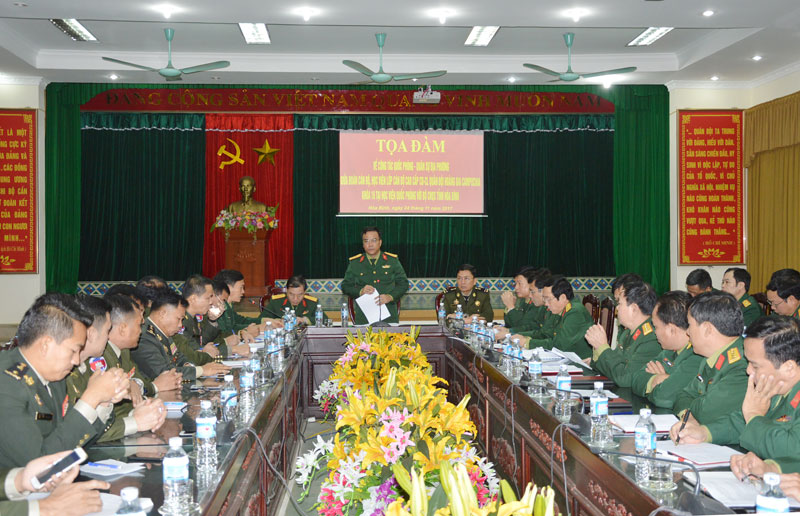
(HBO) - The National Academy of Defense has coordinated with the Military Command of Hoa Binh province to hold a meeting with Cambodian officers and trainees attending the 16th training course at the academy.
The event drew the participation of Colonel Nguyen Van Hong, head of the academy’s International Students Management Department, Lieutenant General Duang Chanh, head of the Cambodian delegation. Leaders of the Party Committee and the provincial Military Command and heads of the Departments of General Staff, Politics, Logistics and Techniques also attended the event.

Photo: Overview of the meeting
At the meeting, the Cambodian trainees were
briefed on the province’s situation by leaders of the provincial Military Command,
along with the results of implementing defence and military activities, including
consultations to the provincial Party Committee and administration in the work,
and education about defence and military knowledge. The trainees also learnt
about the combination of socio-economic development and defence, military activities,
and the building of the province’s armed forces, recruitment and recruit training
and drilling activities, as well as the coordination in performing defense and
military tasks.
Alongside, the representatives of the
provincial Party Committee and Military Command discussed many lessons withdrawn
during the process of implementing defence and military tasks.
At the meeting, the trainees raised their ideas related
to experience in combining socio-economic development with defence and security
tasks in the locality, and the role of the local military agencies in giving
advice in socio-economic development in parallel with strengthening security
and defence. They also discussed the organisation and methods of improving
security and defence knowledge for specific groups, along with defence education
for pupils and students, and the popularisation of the issues to the community.
The Cambodian officers also heard about
advantages and difficulties in managing and training reserve and civil defence
forces, as well as measures and experience in building civil defence forces in
foreign-invested businesses. They also discussed the coordination of defence
agencies of the Military Zone 3, the Ministry of Defence and the Military Command
of the province in building, training and managing reserve forces.
All issues raised by the Cambodian officers and
trainees were answered thoroughly at the event.
On behalf of the Cambodian delegation, Lieutenant
General Duang Chanh spoke highly of information and experience shared by the
province on the implementation of local defence and military missions of the provincial
Military Command. He said the practical experience is valuable lessons for the
trainees to apply in the process of directing and conducting defence tasks
after returning home./.
Hoa Binh province is undergoing a dynamic transformation amid Vietnam’s national digital transition. Building on Poliburo’s Resolution No. 57-NQ/TW on breakthroughs in science, technology, innovation, and national digital transformation, the province has rolled out a wide range of practical action plans. A standout initiative is the "Digital Literacy for All” movement, an effort to ensure that no one is left behind in the digital era.
Hoa Binh province is undergoing a dynamic transformation in the wake of the national digital transformation movement. Building on Resolution No. 57-NQ/TW of the Politburo on breakthroughs in science, technology, innovation, and national digital transformation, the province has implemented a wide range of practical action plans. A standout initiative is the "Digital Literacy for All” movement ambitious effort to ensure that no one is left behind in the digital age.
With a spirit of unity and proactive problem-solving, the Party Committee, the government and the people of Dong Lai Commune (Tan Lac District) have made great strides in implementing the resolutions of the 24th Party Congress of the commune for the 2020 - 2025 term. Focusing on leadership and practical actions, the commune has brought the Party’s resolutions into daily life, creating strong impacts and pushing the local development forward.
Amid the nationwide push for digital transformation, young people in Hoa Binh Province are stepping up as dynamic pioneers, applying technology to enhance Youth Union operations and expand the reach of youth-led initiatives. Through creativity and adaptability, Youth Union organizations at all levels have introduced a series of practical solutions, contributing to modern governance and community development.
In recent years, An Nghia commune, located in Lac Son district, has stepped up administrative reform, focusing on improving the quality and efficiency of its single-window service unit for receiving and processing administrative procedures. These improvements have helped create favourable conditions for local residents and organisations to handle administrative procedures, contributing to the commune’s broader socio-economic development.
The Prime Minister-approved master plan to develop the multi-use value of forests ecosystems through 2030, with a vision to 2050, aims to improve the management and sustainable use of forest resources, create jobs, increase incomes, and improve the living standards of ethnic minorities, people in mountainous and remote areas, forest workers and those living near forests.



